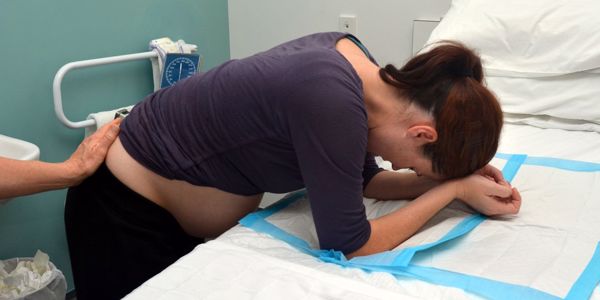We have all heard about individuals being put on bed rest during their pregnancy, but why might you be put on bed rest, and what are some tips and tricks for making it manageable?
Reasons For Bedrest During Pregnancy
The most common reason that a care provider would recommend bed rest for a pregnant person would be for conditions like IUGR, which is a growing problem in a baby, multiples pregnancy, gestational diabetes, and high blood pressure, which can be in tandem with preeclampsia, placenta complications, vaginal bleeding, preterm labor or history of preterm labor, cervical insufficiency, and threatened miscarriage. The practice of bed rest is much less recommended these days because care providers have learned that there are risks that can come from too much rest, and there is little to no evidence that bed rest improves any of these symptoms. Yet still, about 1 in 5 pregnant individuals are told to go on bed rest at some point during their pregnancy.
Risks For Bedrest During Pregnancy
Some of the risks from bed rest are developing blood clots, increased risk for mood disorders like depression and anxiety, stress in the home and on the family, financial pressure, low birth weight for the infant, slower postpartum recovery, and weakened bones and muscles. The longer and more strict that someone is on bed rest, the higher the chance of risk. There are different levels of bed rest, including the intense version of staying in bed all day and getting up for the bathroom, to the less extreme version, which mainly incorporates more rest into your day.
Can You Refuse Bedrest?
If your care provider recommends bed rest, you are within your rights to question them about why that is their recommendation, if there are alternative options, how intense the bed rest needs to be, and how long you will need to rest. Most care providers feel that bed rest will decrease stress and increase blood flow to the placenta, which is why it is recommended for the pregnancy symptoms above.
After discussing your options with your care provider and if you choose to participate in the bed rest, here are a few tips for making it more manageable and how to do it more safely. While resting in bed, most commonly, the best position is on your side with knees and hips bent and with many pillows to support you. Even with all of this support, it is not uncommon for bed rest to cause some muscle and joint aches. To help with these, you can change side-to-side often, squeeze stress balls, push your feet and hands against the bed, and stretch.
Ask For Help
While on bed rest, asking for help is key. Having people bring you and your family meals, taking your younger kids for playdates or your dogs on walks, and having visitors come over can all help improve your situation. Other things you can do while on bed rest include starting a journal, learning a new language, doing puzzles, listening to podcasts or a book, doing art, finding community, establishing a routine that works with your bed rest, not against it, making baby preparations that can be done from your bed or couch, and doing simple organization or nesting even if that is you directing someone from the bed.
Simply click here and enter your details for your chance to win a $250 Amazon spend today!
Avoid Google
Although having the internet and answers at the tips of our fingers can feel helpful, it can also bring about more stress. Stepping back from Google and social media can help improve your mental health when your mental health is impacted dramatically. The more you can find ways to improve your mental health, the easier this time will be, and in most cases, Google and social media lower mental health.
While it is a good idea to step back from Googling symptoms, knowing some general warning signs to look for while on bed rest is a good idea. If you have a painful, swollen, hot-to-the-touch spot on your leg, feel short of breath or have chest pain, have contractions or leaking of amniotic fluid, have a high blood pressure reading, feel a decrease in fetal movement, or experience any labor sensations, it is a good idea to call your care provider and alert them of what is going on.
Takeaway
Whether or not you go on bed rest, continue to trust your body and your intuition regarding pregnancy. You are the expert on your body, and this baby, your care provider, is an expert on general pregnancy, birth, and postpartum. By working together, you can develop a plan that feels safe for everyone included.







